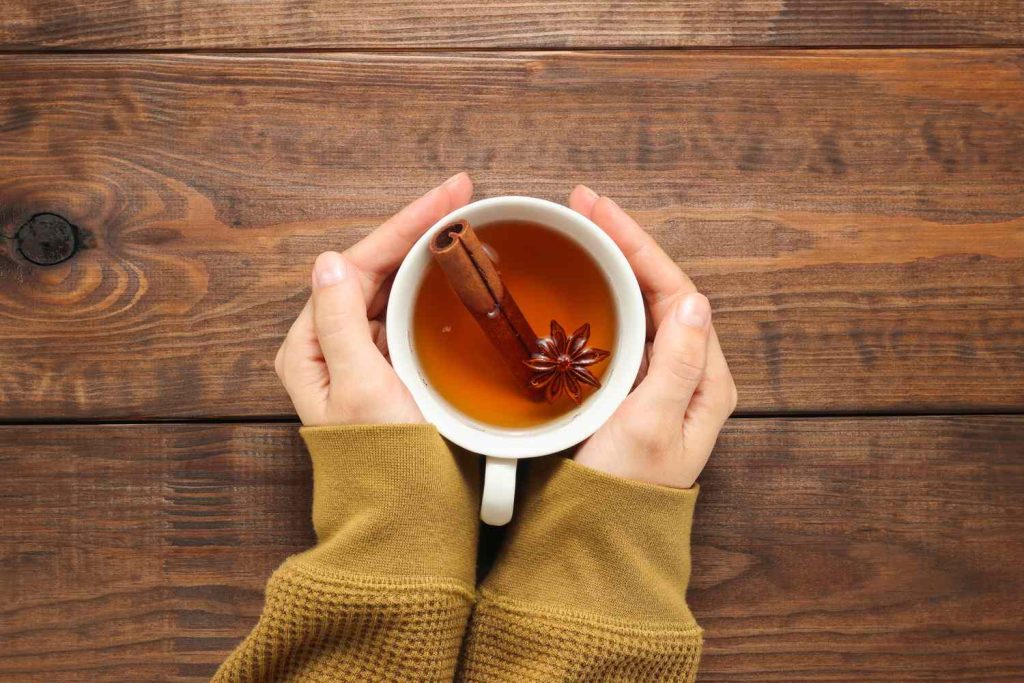:max_bytes(150000):strip_icc():format(jpeg)/GettyImages-1340715452-97b58280124c49229fbdcab46ca1fda4.jpg)
Cinnamon tea is a naturally sweet and spicy beverage made by infusing hot water with cinnamon bark. It has been used for centuries in traditional medicine and as a home remedy for various health conditions. Cinnamon spice contains antioxidant and anti-inflammatory compounds associated with several health benefits.
Increasing evidence supports the benefits of drinking cinnamon tea, although more evidence is needed to make firm conclusions.
1. Lower Blood Sugar
Cinnamon tea could lower blood sugar by working like insulin by reducing glucose in the blood. This effect is particularly beneficial for people with diabetes or prediabetes (when blood sugar levels are elevated but not high enough to be diabetes).
According to one study, people who consumed 3 to 6 grams (g)—approximately 1 to 2 teaspoons—of cinnamon daily for 40 days had significantly reduced blood sugar than before the experiment.
In another study, participants drank cinnamon tea immediately after a meal; researchers found that their blood sugar significantly decreased compared to a control group who did not drink cinnamon tea after their meal.
2. Reduce Period Pain
Dysmenorrhea, or painful periods, affects up to 90% of teenagers who menstruate. Cinnamon tea is one home remedy believed to help reduce that pain, and there is even some evidence to back up this claim.
According to one study of 27 teenage girls with period pain, drinking cinnamon tea reduced pain scores significantly. Other research using cinnamon supplements rather than tea (but in similar quantities) also found that consuming cinnamon in this way can reduce period pain.
3. Reduce Menstrual Bleeding
Heavy menstrual bleeding, also called menorrhagia, involves periods that last a week or more and/or require you to change your tampon or pad every two hours or less.
One study of 76 women found that those who took 420 milligrams (mg)—less than a teaspoon—of cinnamon capsules three times daily had significantly reduced menstrual bleeding compared to a placebo group (a control group of study participants not getting an active substance).
Although this study did not use cinnamon tea, it’s possible that consuming the same quantity of cinnamon in tea form, rather than capsule, could have similar effects.
4. Lower Cholesterol
High cholesterol levels can increase your chance of heart disease, heart attack, and stroke, among other health conditions. For many people, lowering their cholesterol is a health goal. Drinking cinnamon tea is sometimes recommended to help lower cholesterol, but the evidence is mixed, with some researchers calling this benefit of cinnamon tea “controversial.”
One systematic review (a review of pertinent scientific literature) examined cinnamon’s effects on cholesterol among 750 participants across 13 randomized controlled trials. The researchers found that cinnamon did not affect low-density lipoprotein (LDL) cholesterol (“good cholesterol”) or high-density lipoprotein (HDL) cholesterol (“bad cholesterol”). However, they did find that cinnamon lowered levels of triglycerides, another type of fat in the blood, and total cholesterol (a combination of HDL and LDL).
In another study, overweight and obese women were instructed to drink 50 milliliters (mL) of cinnamon tea twice daily for four weeks. At the end of the experiment, their total cholesterol was significantly reduced.
5. Reduce Nausea and Vomiting
Cinnamon is a common natural remedy for nausea. Many people find that the flavors and heat of cinnamon tea soothe nausea.
Consuming cinnamon capsules can help reduce nausea and vomiting during menstruation. In one study involving people with cancer, inhaling air from a pad moistened with cinnamon oil effectively reduced nausea and vomiting compared to a placebo group.
While the evidence does not support the use of cinnamon tea for nausea and vomiting, people who drink the tea do breathe in cinnamon vapors along with ingesting cinnamon and may experience similar results.
6. Lower Blood Pressure
High blood pressure (hypertension) can increase your risk of illnesses such as stroke, heart attack, and chronic kidney disease. Healthcare providers frequently recommend exercise and medication to lower blood pressure. Although the evidence is limited, cinnamon has also been suggested as a home remedy.
Studies from 2021 suggest that cinnamon may help lower both systolic and diastolic blood pressure—the top (systolic) and bottom (diastolic) numbers of your blood pressure reading measuring the force of blood against artery walls when the heart contracts (systolic) and while at rest (diastolic).
There is no research specifically involving cinnamon tea, just cinnamon supplements. Although the current research is promising, more is needed to confirm cinnamon’s effects on blood pressure.
7. Manage Obesity
Several studies have found that taking cinnamon supplements is associated with reduced body mass index (BMI), a commonly used (although flawed) measurement of body fat and overall body weight, waist circumference, and fat mass.
Some research looks at cinnamon tea, specifically, as opposed to supplements.
According to one study, drinking cinnamon tea for four weeks was associated with significant reductions in BMI, body weight, waist-to-hip ratio, and various body circumference measurements. Two other studies have also found that drinking cinnamon tea supports weight loss.
Side Effects and Who Should Avoid
Drinking and eating cinnamon in small amounts, like those typically found in foods or tea, is considered safe. However, there can be side effects if you consume large amounts of cinnamon or consume it for long periods of time. These might include gastrointestinal problems or allergic reactions.
Certain types of cinnamon can also interact with drugs or affect people with certain conditions. Talk to your healthcare provider about drinking cinnamon tea regularly, or supplementing with cinnamon, if you:
- Are pregnant or breastfeeding
- Have liver disease
- Smoke or otherwise use nicotine
- Take anticancer medicine (chemotherapy)
How to Make Cinnamon Tea
Cinnamon tea should have an amber color and a spicy, sweet scent. There is no universal way to make cinnamon tea, but here are a few suggestions:
- Soaking cinnamon sticks: In one study, researchers prepared cinnamon tea by soaking 60 g cinnamon sticks in 1,000 mL of room-temperature water. After 24 hours, they heated the solution for 30 minutes at 212 degrees F and filtered it before serving.
- Boiling cinnamon sticks: A similar but quicker alternative to the option above would be to skip the soaking step, boil cinnamon sticks with water, and then filter it. This should reduce prep time from over 24 hours to about 15 minutes. However, this method may have lower cinnamon content in the tea.
- Cinnamon powder: To make a large batch using powdered cinnamon, boil water with 1 to 2 teaspoons of cinnamon per cup (8 ounces) of water. To make a single serving, use 1 to 2 teaspoons of powdered cinnamon in an infuser and pour boiling water over it in a cup. You can try filtering with fine mesh cloth as well, but this option may retain some graininess from the powder.
- Tea bags: Cinnamon tea bags are commercially available, although they may contain lower quantities of cinnamon than the above two options.
Summary
It is possible that drinking cinnamon tea regularly could help with health concerns like lowering blood pressure and cholesterol, losing weight, and managing menstruation. However, scientists are still learning about the benefits of cinnamon tea, as well as the spice cinnamon in general.








